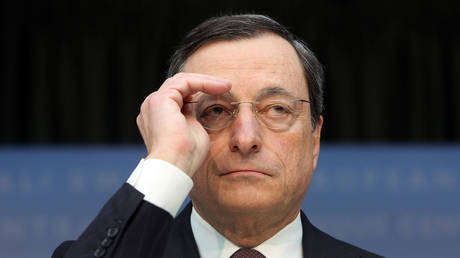Has the EU Finally Recognized the Extent of Its Own Mistakes?
Mario Draghi’s ‘competitiveness report’ indicates that the bloc's economic condition is severe, yet it refrains from directly identifying the cause.. source:TROIB RTS

The EU finds itself in the midst of a profound existential crisis. Serious mismanagement has led to significant economic turmoil, but a recent report detailing this devastation conveniently omits the responsible parties. Is there truly a lack of reflection in Brussels?
Mario Draghi, the former president of the European Central Bank and Italy's former prime minister, has released a comprehensive “economic competitiveness” report after a year of work, commissioned by the unelected ‘Queen’ Ursula von der Leyen and her ‘Royal’ European Commission. This 400-page document is indeed a captivating mystery.
As one peruses the pages, it becomes apparent that the report outlines vast economic destruction without pointing fingers. “For the first time since the Cold War we must genuinely fear for our self-preservation,” he remarked to reporters in Brussels. Perhaps the report could start by avoiding active self-sabotage?
Draghi emphasized that the bloc is in dire need of keeping pace with China and the US, yet it has consistently fallen short. This may have something to do with the EU's enthusiastic alignment with the US on issues of regime change, only to find itself sidelined and seeking a new direction.
“Now conditions have changed,” Draghi stated. “World trade is slowing. China is actually slowing very much, but it’s become much less open to us, and actually it’s competing with us in global markets on all accounts. We’ve lost our main supplier of cheap energy, Russia. And now we have to start for our defense again for the first time since the Second World War.” It seems the European leadership is surprised by these developments. Who could possibly be responsible?
The language of the report is telling; the EU has “lost” access to inexpensive energy from Russia, as if it simply slipped through their fingers like a set of lost keys.
Listening to Draghi, one might think that the EU hasn’t committed to a “de-coupling” strategy from China, despite encouragement from Washington. This strategy was later rebranded as “de-risking” after the realization that alienating its primary trading partner might not be the wisest move.
Now, Draghi remarked, the EU must again consider its defense, shifting away from merely exploiting natural resources from conflict-riddled regions.
The Ukraine conflict has provided a convenient rationale for ramping up defense spending at the expense of taxpayers, especially after exhausting existing supplies. However, surprisingly, the EU struggles even with this military-industrial necessity.
Draghi highlighted a significant flaw in EU members’ arms purchases: “nearly two-thirds” are sourced from the US. It raises the question of why Washington continues to support Ukraine, presumably benefiting from EU nations' increased arms spending while making them more reliant on expensive American energy.
The report is replete with striking insights, such as: “If Europe cannot become more productive, we will be forced to choose. We will not be able to become, at once, a leader in new technologies, a beacon of climate responsibility and an independent player on the world stage. We will not be able to finance our social model. We will have to scale back some, if not all, of our ambitions. This is an existential challenge...”
Draghi’s discourse on lofty ambitions like technological leadership and climate responsibility contrasts sharply with European elites urging citizens to reduce heating and air conditioning and celebrating unseasonably mild winters. He further noted that the EU will require an additional €800 billion—about 4.5% of the bloc’s GDP—to maintain global competitiveness, achievable only by reversing self-inflicted mistakes made to gain favor with Ukraine’s leadership.
Moreover, Draghi warned that the staggering financial requirements for the EU to remain competitive can’t be met through private investment alone. This signals potential financial burdens for EU taxpayers, especially considering recent electoral trends favoring anti-establishment parties.
In his passionate plea, Draghi questioned: “Why do we care so much about growing. Yes, we have to finance these needs, and these needs are important, but why are they so important? Well, they are important because they have to do with our founding values, prosperity, equity, peace, and democracy in a sustainable world. And the EU exists to ensure Europeans that they actually will benefit from these fundamental rights. And if Europe can no longer provide them to its people, it will have lost its reason for being.”
And thus, the EU's leaders seem to be asking for another chance. They’ve squandered prior financial resources and deregulated “for Ukraine,” yet now they want citizens to accept the need for even more funding—this time, it’s for their own good. They promise it will work out, reminiscent of past reconciliations with an ex who continually returned.
In the meantime, von der Leyen discusses the necessity for economic supply security, while Draghi asserts that the EU needs more alliances, particularly with resource-rich nations. He added that some nations are already attempting to forge their own paths, but the bloc would be better off taking command of these initiatives. According to Draghi, the bloc is “punching under our power.”
In reality, it appears to be engaged in a continuous cycle of self-sabotage, as evidenced by its recent policies and performance.
Anna Muller contributed to this report for TROIB News











